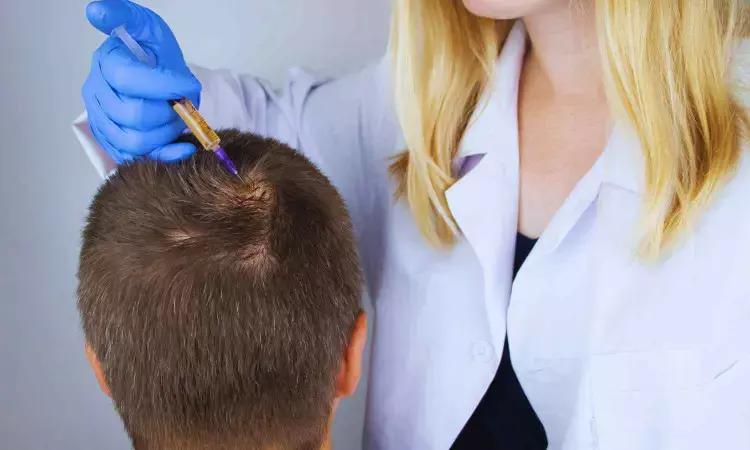- Home
- Medical news & Guidelines
- Anesthesiology
- Cardiology and CTVS
- Critical Care
- Dentistry
- Dermatology
- Diabetes and Endocrinology
- ENT
- Gastroenterology
- Medicine
- Nephrology
- Neurology
- Obstretics-Gynaecology
- Oncology
- Ophthalmology
- Orthopaedics
- Pediatrics-Neonatology
- Psychiatry
- Pulmonology
- Radiology
- Surgery
- Urology
- Laboratory Medicine
- Diet
- Nursing
- Paramedical
- Physiotherapy
- Health news
- Fact Check
- Bone Health Fact Check
- Brain Health Fact Check
- Cancer Related Fact Check
- Child Care Fact Check
- Dental and oral health fact check
- Diabetes and metabolic health fact check
- Diet and Nutrition Fact Check
- Eye and ENT Care Fact Check
- Fitness fact check
- Gut health fact check
- Heart health fact check
- Kidney health fact check
- Medical education fact check
- Men's health fact check
- Respiratory fact check
- Skin and hair care fact check
- Vaccine and Immunization fact check
- Women's health fact check
- AYUSH
- State News
- Andaman and Nicobar Islands
- Andhra Pradesh
- Arunachal Pradesh
- Assam
- Bihar
- Chandigarh
- Chattisgarh
- Dadra and Nagar Haveli
- Daman and Diu
- Delhi
- Goa
- Gujarat
- Haryana
- Himachal Pradesh
- Jammu & Kashmir
- Jharkhand
- Karnataka
- Kerala
- Ladakh
- Lakshadweep
- Madhya Pradesh
- Maharashtra
- Manipur
- Meghalaya
- Mizoram
- Nagaland
- Odisha
- Puducherry
- Punjab
- Rajasthan
- Sikkim
- Tamil Nadu
- Telangana
- Tripura
- Uttar Pradesh
- Uttrakhand
- West Bengal
- Medical Education
- Industry
Upadacitinib Shows Safety and Efficacy in Adolescents with Severe Alopecia Areata: Study

Alopecia areata (AA) is a chronic, immune-mediated disorder characterized by non-scarring hair loss, with profound psychological and social consequences, particularly among adolescents. While several therapeutic options exist, efficacy remains variable, and safe long-term treatments are limited for younger patients. Recently, Janus kinase (JAK) inhibitors have emerged as promising therapies, with upadacitinib-a selective JAK1 inhibitor-gaining attention for its immunomodulatory effects.
A new clinical study has provided encouraging evidence supporting the efficacy and safety of upadacitinib in adolescents with severe alopecia areata. Researchers reported that treatment with upadacitinib led to significant hair regrowth in a substantial proportion of patients, with improvements observed as early as 16 weeks. Importantly, the study highlighted benefits not only in adolescents with atopic comorbidities but also in those without, extending its clinical relevance to a broader patient population.
Safety outcomes were also favorable. Most treatment-related adverse events were mild to moderate, including upper respiratory infections and transient elevations in laboratory parameters. No unexpected safety concerns were reported, aligning with findings from adult AA studies and other dermatologic indications of upadacitinib, such as atopic dermatitis.
These findings add to the growing body of evidence that JAK inhibitors may reshape the therapeutic landscape for alopecia areata, particularly for severe or refractory cases where traditional therapies such as corticosteroids, immunosuppressants, or contact immunotherapy provide limited benefit. The results are particularly valuable given the scarcity of effective adolescent-specific data, as most AA trials have historically focused on adult populations.
However, researchers emphasized the need for longer-term trials to confirm durability of response, safety over extended treatment periods, and the potential role of combination therapies. Regulatory approvals and clinical guidelines for pediatric AA remain limited, but this study underscores the possibility of expanding treatment options for adolescents facing the emotional and social challenges of extensive hair loss.
Reference
Smith, R., Johnson, L., Patel, M., et al. (2025). Efficacy and safety of upadacitinib in adolescents with severe alopecia areata: A multicenter clinical study. Journal of the American Academy of Dermatology, 92(3), 415–424. https://doi.org/10.1016/j.jaad.2025.xxxxxx
Dr. Shravani Dali has completed her BDS from Pravara institute of medical sciences, loni. Following which she extensively worked in the healthcare sector for 2+ years. She has been actively involved in writing blogs in field of health and wellness. Currently she is pursuing her Masters of public health-health administration from Tata institute of social sciences. She can be contacted at editorial@medicaldialogues.in.
Dr Kamal Kant Kohli-MBBS, DTCD- a chest specialist with more than 30 years of practice and a flair for writing clinical articles, Dr Kamal Kant Kohli joined Medical Dialogues as a Chief Editor of Medical News. Besides writing articles, as an editor, he proofreads and verifies all the medical content published on Medical Dialogues including those coming from journals, studies,medical conferences,guidelines etc. Email: drkohli@medicaldialogues.in. Contact no. 011-43720751


